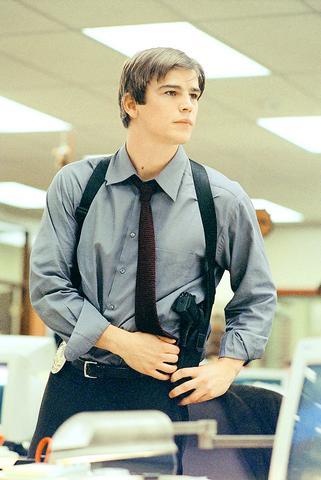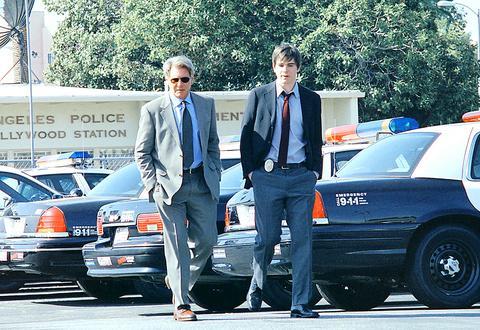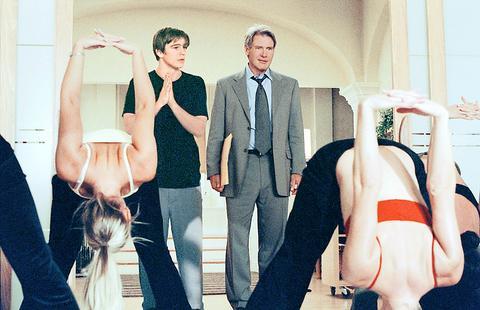In Hollywood Homicide Harrison Ford plays Joe Gavilan, a veteran Los Angeles detective with money troubles, three ex-wives and a goofy, undisciplined young partner. Gavilan, in other words, is a walking cop-movie cliche, something Ford seems happy to acknowledge.
He slips into the role as if it were a pair of well-worn loafers, the left inherited from Peter Falk, the right from Clint Eastwood, and then proceeds, with wry nonchalance, to tap-dance, shuffle and pirouette through his loosest, wittiest performance in years. It has been a long time since his gift for comedy -- evident in the first Star Wars and Indiana Jones pictures, and also in Mike Nichols' Working Girl -- has peeked out from behind that clenched, morose action-hero face. Ford can be as gruff, decisive or brave as a given dramatic situation demands, but he is also sarcastic, foolish and, in his laconic, leathery way, downright silly.
Gavilan is the kind of character that Ron Shelton, who directed Hollywood Homicide (and wrote it with Robert Souza), has made something of a specialty. Shelton's movies often show a mocking appreciation for underachieving, no-longer-young men whose failures and compromises give them a rough, self-deprecating wisdom and a slow-burning, grown-up charm. Kevin Costner, before he was swallowed up by his own self-righteousness, perfected this type in Bull Durham and revisited it in Tin Cup. In Dark Blue, released this year, Kurt Russell laid bare the vanity and corruption underneath the scruffy, hangdog charm of a similar kind of man and reminded the few people who saw the film that, when he feels like it, he can be as disciplined and magnetic as any actor his age.

PHOTO COURTESY OF FOX MOVIES
Though Hollywood Homicide takes place, like Dark Blue, in the seamier sections of the Los Angeles Police Department's bureaucracy, it is a jauntier, breezier picture; it wears its cynicism about individual and institutional ethics lightly. Shelton has a sure, understated feel for the colliding, overlapping subcultures of Los Angeles, a city that, through his eyes, offers unlimited opportunities for envy, self-invention and delusional ambition. Everyone is pretending to be -- or wishing to be -- someone else.
Neither Gavilan nor his young partner, K.C. Calden (Josh Hartnett), is entirely satisfied with police work. Gavilan, who once attended a real estate seminar, juggles police professionalism with dubious deal making, while Calden moonlights as a yoga instructor and dreams, like every other halfway good-looking guy in town, of becoming an actor. Hartnett, in what might be called, thinking back on Bull Durham, the Tim Robbins protege role, matches Ford's shambling irritability with a smooth, deceptive sweetness. Calden is an effortless seducer; his yoga students take his gentle dimness for spiritual elevation, and you can't be certain they're altogether wrong.
Gavilan and Calden's big case -- a quadruple homicide at a hip-hop club -- plunges them into the underside of the music business, which someone once said was invented to make the movie industry look good. Here, it is a demimonde of disposable celebrity and limitless greed, embodied by a label owner named Antoine Sartain (Isaiah Washington) who, when it comes to enforcing contracts, seems to think that executive is a synonym for executioner.

The plot is suitably, perhaps predictably intricate. One bad cop (Bruce Greenwood) is after Gavilan's badge; another (Dwight Yoakam) may have been involved in the murder of Calden's father, who was also a police officer. The various record-industry and law-enforcement bad guys are linked in a brutal conspiracy that you will unravel well before Gavilan and Calden do.
But the plot is not really the point. It is, instead, the hammered together frame that contains a motley collage of riffs, sketches and variations on some of Shelton's favorite themes, including the absurdity and nobility of manhood, the sex appeal of mature women and the varieties of interracial and intergenerational misunderstanding.
There are scenes that appear to have been as much fun to write and to shoot as they are to watch: a foot and pedal-boat chase across a muddy canal; parallel interrogations derailed by yoga poses and ringing cellphones; and anything calling for the presence of Lena Olin (as Gavilan's lover, a radio psychic) or Lolita Davidovich (as a madam).

PHOTOS COURTESY OF FOX MOVIES
Really, though, there are too many deft grace notes and underplayed jokes to take in at a single viewing. Shelton is a master of the telling, offhand detail. Gavilan's cellphone plays the opening bars of My Girl, a choice that marks him as an old-school sentimentalist. Later, he dances alone to The Tracks of My Tears, prefiguring an astounding cameo from Smokey Robinson himself, playing an impatient cabdriver.
Gavilan's protestations that he just doesn't get hip-hop may be stiff-necked Motown nostalgia or Columbo-style guilelessness. Or it may be, as Calden points out, that he's not supposed to get it. Shelton does, however, selecting a fine sampling of East and West Coast beats for the soundtrack and bringing on rap world figures like Kurupt and Master P in supporting roles. (Something of an old-school soul man himself, Shelton also contrives to have Gladys Knight answer a door when Gavilan knocks on it.)
A less confident, less devil-may-care filmmaker might have wrapped it all up with a parade of revelations and just deserts, but Shelton seems to trust his audience to figure out the plot points and so treats us, at the end, to a long, crazy car chase, a carnival of slapstick mayhem complete with real estate negotiations, dueling TV helicopters and Robert Wagner splattered with wet concrete as he prepares to christen his star on the Walk of Fame outside Grauman's Chinese Theater.

Last week, on the heels of the recall election that turned out so badly for Taiwan, came the news that US President Donald Trump had blocked the transit of President William Lai (賴清德) through the US on his way to Latin America. A few days later the international media reported that in June a scheduled visit by Minister of National Defense Wellington Koo (顧立雄) for high level meetings was canceled by the US after China’s President Xi Jinping (習近平) asked Trump to curb US engagement with Taiwan during a June phone call. The cancellation of Lai’s transit was a gaudy

Following the shock complete failure of all the recall votes against Chinese Nationalist Party (KMT) lawmakers on July 26, pan-blue supporters and the Chinese Communist Party (CCP) were giddy with victory. A notable exception was KMT Chairman Eric Chu (朱立倫), who knew better. At a press conference on July 29, he bowed deeply in gratitude to the voters and said the recalls were “not about which party won or lost, but were a great victory for the Taiwanese voters.” The entire recall process was a disaster for both the KMT and the Democratic Progressive Party (DPP). The only bright spot for

From Godzilla’s fiery atomic breath to post-apocalyptic anime and harrowing depictions of radiation sickness, the influence of the nuclear bombings of Hiroshima and Nagasaki runs deep in Japanese popular culture. In the 80 years since the World War II attacks, stories of destruction and mutation have been fused with fears around natural disasters and, more recently, the Fukushima crisis. Classic manga and anime series Astro Boy is called “Mighty Atom” in Japanese, while city-leveling explosions loom large in other titles such as Akira, Neon Genesis Evangelion and Attack on Titan. “Living through tremendous pain” and overcoming trauma is a recurrent theme in Japan’s

As last month dawned, the Democratic Progressive Party (DPP) was in a good position. The recall campaigns had strong momentum, polling showed many Chinese Nationalist Party (KMT) lawmakers at risk of recall and even the KMT was bracing for losing seats while facing a tsunami of voter fraud investigations. Polling pointed to some of the recalls being a lock for victory. Though in most districts the majority was against recalling their lawmaker, among voters “definitely” planning to vote, there were double-digit margins in favor of recall in at least five districts, with three districts near or above 20 percent in